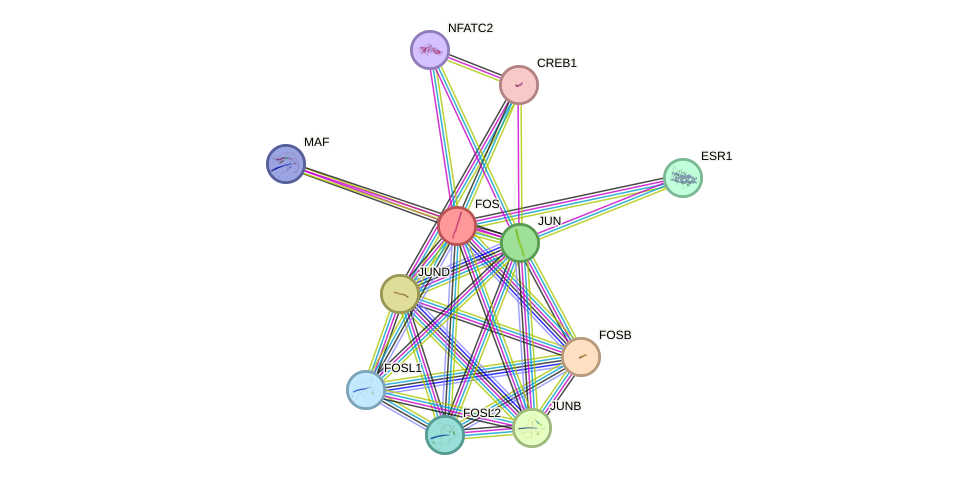GenAge entry for FOS (Homo sapiens)
Gene name (HAGRID: 50)
- HGNC symbol
- FOS
- Aliases
- c-fos; AP-1
- Common name
- FBJ murine osteosarcoma viral oncogene homolog
Potential relevance to the human ageing process
- Main reason for selection
- Entry selected based on indirect or inconclusive evidence linking the gene product to ageing in humans or in one or more model systems
- Description
The FOS oncogene plays an important role in development, cell proliferation, and differentiation [118]. As part of the AP-1 transcriptional complex, FOS has been associated with age-related changes and with the attenuated cellular response in older cells [851]. Still, its relevance to human ageing remains under debate.
Cytogenetic information
- Cytogenetic band
- 14q24.3
- Location
- 75,278,778 bp to 75,282,234 bp
- Orientation
- Plus strand
Protein information
- Gene Ontology
-
Process: GO:0001661; conditioned taste aversion
GO:0006306; DNA methylation
GO:0006357; regulation of transcription from RNA polymerase II promoter
GO:0006366; transcription from RNA polymerase II promoter
GO:0006954; inflammatory response
GO:0007179; transforming growth factor beta receptor signaling pathway
GO:0007399; nervous system development
GO:0007565; female pregnancy
GO:0007568; aging
GO:0009409; response to cold
GO:0009416; response to light stimulus
GO:0009629; response to gravity
GO:0009636; response to toxic substance
GO:0030431; sleep
GO:0031668; cellular response to extracellular stimulus
GO:0032496; response to lipopolysaccharide
GO:0032570; response to progesterone
GO:0032870; cellular response to hormone stimulus
GO:0034097; response to cytokine
GO:0034614; cellular response to reactive oxygen species
GO:0035902; response to immobilization stress
GO:0035914; skeletal muscle cell differentiation
GO:0035994; response to muscle stretch
GO:0038095; Fc-epsilon receptor signaling pathway
GO:0042493; response to drug
GO:0045672; positive regulation of osteoclast differentiation
GO:0045893; positive regulation of transcription, DNA-templated
GO:0045944; positive regulation of transcription from RNA polymerase II promoter
GO:0051090; regulation of sequence-specific DNA binding transcription factor activity
GO:0051412; response to corticosterone
GO:0051591; response to cAMP
GO:0060395; SMAD protein signal transduction
GO:0071277; cellular response to calcium ion
GO:1902895; positive regulation of pri-miRNA transcription from RNA polymerase II promoter
Cellular component: GO:0005634; nucleus
GO:0005654; nucleoplasm
GO:0005667; transcription factor complex
GO:0005783; endoplasmic reticulum
GO:0005829; cytosol
GO:0016020; membrane
GO:0043005; neuron projection
Hide GO termsFunction: GO:0000978; RNA polymerase II core promoter proximal region sequence-specific DNA binding
GO:0000979; RNA polymerase II core promoter sequence-specific DNA binding
GO:0000982; transcription factor activity, RNA polymerase II core promoter proximal region sequence-specific binding
GO:0001077; transcriptional activator activity, RNA polymerase II core promoter proximal region sequence-specific binding
GO:0003682; chromatin binding
GO:0003700; transcription factor activity, sequence-specific DNA binding
GO:0005515; protein binding
GO:0008134; transcription factor binding
GO:0044212; transcription regulatory region DNA binding
GO:0046982; protein heterodimerization activity
GO:0070412; R-SMAD binding
Protein interactions and network
- Protein-protein interacting partners in GenAge
- EGFR, JUND, FOS, CREBBP, ABL1, UBE2I, CEBPA, EP300, PML, RB1, APP, RELA, SIRT1, HSPA1A, JUN, MAPK9, TAF1, ATF2, TBP, DDIT3, ESR1, CLU, CHEK2, NCOR2
- STRING interaction network
Retrieve sequences for FOS
Homologs in model organisms
In other databases
- CellAge
- This gene is present as FOS

